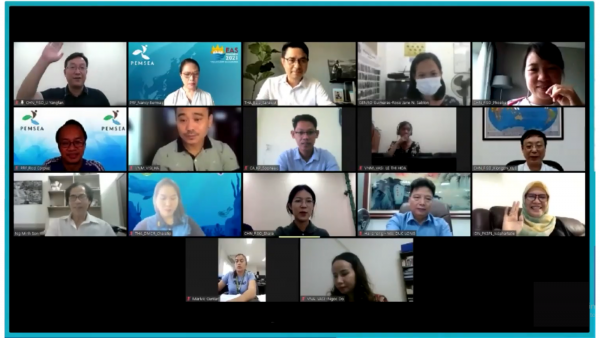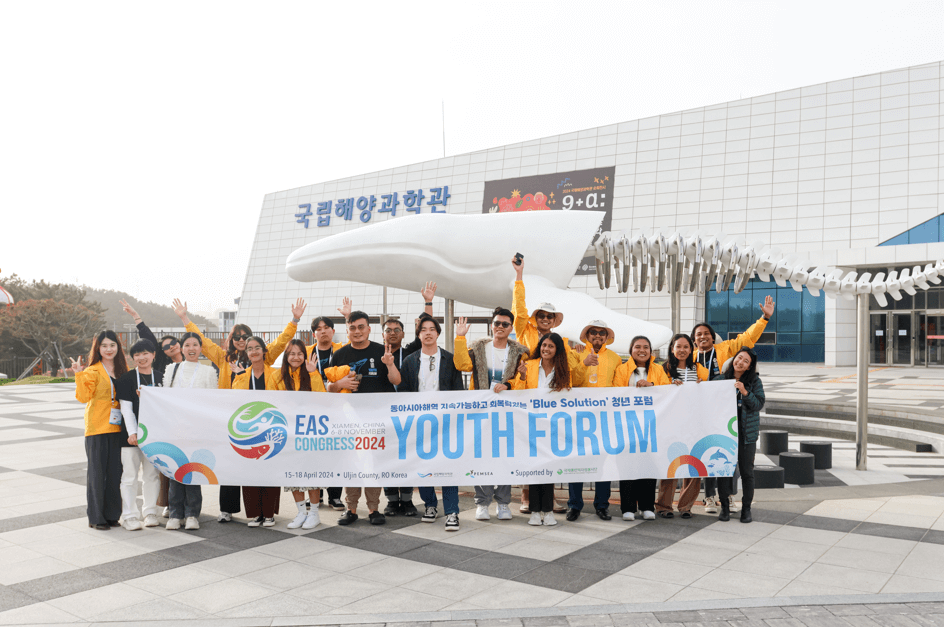Xiamen University, PEMSEA hold regional training program on ICM and MSP for officials and practitioners
Thursday, 21 October 2021

Home to over 50 percent of the world’s population, coastal areas contribute to almost 50 percent of the world’s Gross Domestic Product (GDP) and provide a diverse set of ecosystem services that benefit human society. On top of climate change, increasing population, and intensified human activities, unrestrained and unsustainable utilization of coastal and marine resources resulting in ecosystem degradation, biodiversity loss, and water pollution has placed unprecedented pressure on coastal areas.
Integrated coastal management (ICM) has been proven and tested in the East Asian Region as a mechanism for strengthening coastal governance and in the integrated implementation of management programs that addresses the above challenges, including multiple use conflicts. Linking ICM and marine spatial planning (MSP), a public process of analyzing and allocating the spatial and temporal distribution of human activities in marine areas could effectively resolve the conflicts between the land and sea interface and various ocean uses to maintain a healthy and resilient ocean and coastal environment.
In a virtual training program entitled “ICM and MSP: Moving Beyond Planning for Sustainable Development of Coastal and Marine Areas in the East Asian Region,” jointly organized by the Fujian Institute for Sustainable Oceans (FISO) of Xiamen University (XMU) and Partnerships in Environmental Management for the Seas of East Asia (PEMSEA), coastal managers and experts from the government, academe and other sectors underscored the need to revisit the mutually reinforcing concepts, frameworks, and practices of ICM and MSP; the conceptual and operational challenges faced by MSP; and how the East Asian region’s practical experiences in ICM can facilitate the wider application and implementation of MSP.
The four-day training program, held virtually from September 14 to 17, attracted participants from 10 countries—Cambodia, China, Indonesia, Japan, Malaysia, Papua New Guinea, Philippines, Thailand, Timor-Leste and Viet Nam. Among them, 46 were government officials in the field of ocean and coastal management, while 13 were lecturers and researchers from various universities and research institutes.

On Day 1, Ms. Nancy Bermas, PEMSEA Senior Programme Manager, provided the backdrop for understanding the various coastal and ocean management paradigms and area-based approaches and discussed where MSP fits in. She covered the evolution of ICM and the efforts to scale up its practice in East Asia from 1993 to 2020 as well as the status and trends in MSP from the 1980s to 2017. She showed aspects of ICM and MSP that are complementary particularly with respect to their attributes, underlying principles, and their processes. Ms. Bermas expounded on the objectives and spatial coverage of other effective area-based approaches such as integrated water resources management, integrated river basin management, marine protected areas, ecosystems approach to fisheries management, source-to-sea, other effective area- based conservation measures and areas beyond national jurisdiction; the integration of ICM and MSP; and opportunities for collaboration in capacity development and networking in support of the IOC UNESCO’s 2030 MSP Roadmap and Sustainable Development Strategy for the Seas of East Asia (SDS-SEA) Roadmap to 2030.
ICM and MSP Implementation in East Asian Seas
Dr. Yue Qui, Deputy Director of the Division of Sea Area and Island Management Technology at the National Ocean Technology Center in China, stressed the importance of MSP, referred to as marine functional zoning (MFZ) in China, in protecting and sustainably utilizing the ocean. MSP practices were initiated in the country in the 1980s and have undergone close to four decades of development, during which laws and regulations were adopted and implemented at national, provincial and municipal levels. To date, MFZ implementation in China has resulted in highly positive effects on sea use, coastal economic development, and environmental protection.
Meanwhile, Prof. Xue Xiongzhi, Coordinator General of FISO, showcased Xiamen’s West Sea to illustrate the importance of MFZ in managing multiple use conflicts that guided ICM implementation in Xiamen, particularly in the ecosystem rehabilitation of the Xiamen West Sea, which under the Xiamen MFZ Scheme, is meant to be used primarily for ports, shipping, and tourism. Since 1997 when the MFZ scheme was established, several steps have been undertaken to rehabilitate the area. Aquaculture was removed, causeway opened, channel dredged, anchorage expanded, reclamation restricted, wetland parks and natural conservation zones for rare species established, and water pollution treated. As a result, water quality improved, with total nitrogen and phosphorus significantly reduced and the sea area expanded by 8 sq. km., the coastline by 14 km, and the amount of water flowing in and out by 30 million cu. m.
Dr. Peng Benrong, Professor, Coastal and Ocean Management Institute, Xiamen University, elaborated on the application of a systematic framework to analyze the overall benefits and costs and evaluating trade-off between alternative coastal policies using the MFZ implementation under the Xiamen ICM programme as a case study. The evaluation suggested that the implementation of the revised MFZ in 2011 has been a sound policy decision in view of the impressive increase in net socioeconomic benefits. Although the new policy scenario has led to a reduction of environmental benefits, the efforts to adapt environmentally-friendlier sea area use activities and to conserve and restore coastal habitats have alleviated these negative impacts to the coastal ecosystems.

In the Philippines, Mr. Luis Awitan, Head of the Provincial Government Environment and Natural Resources Office (PGENRO) of Batangas Province, shared Balayan Bay’s experience in the development and adoption of an integrated coastal and marine spatial use plan (ICMSUP) involving 9 municipalities encompassing the bay. The ICMSUP preparation and planning process were characterized by multistakeholder participation and engagement. The estimation of the economic values of the benefits and costs of the most common zones across coastal municipalities provided inputs to policy and decision making as regard resolving conflicts and setting of fines for violations. Mr. Awitan also discussed the roles and responsibilities of the various stakeholders in the implementation of the plan.
Capping Day 4 of the training were presentations from 5 ICM sites in Cambodia, Indonesia, Malaysia, Thailand, and Viet Nam covering in general, their experiences in the zoning process, legal and regulatory process, key accomplishments, lessons learned and way forward, and in particular, issue-specific management concerns in line with zoning plan development, adoption and implementation:
- Beach zoning implementation for sustainable coastal tourism and management by Mr. Prak Visal, ICM Coordinator, Preah Sihanouk Province, Cambodia
- Integrated land and marine spatial plan: Impacts on habitat and biodiversity conservation by Mr. Fakrie Wahyudin, Sub-Division Head of Spatial and Land Affairs Planning, Research and Development Agency, Bontang City, Indonesia
- Water resources management strategies towards sustainable river and coastal development in Selangor, Malaysia by Ms. Haslina Binti Amer, Principal Assistant Director, Selangor Water Management Authority
- Coastal erosion risk management in Chonburi, Thailand by Ms. Nisakorn Wiwekwin, Public Health and Environment Department Officer and ICM Coordinator, Saensuk Municipality, Chonburi Province, Thailand
ICM and coastal use zoning in Thua Thien Hue, Vietnam by Dr. Nguyen Minh Son, Former Deputy Director, Institute of Environmental Technology

The training discussed potential areas of collaboration on capacity development under the purview of the MSP and SDS-SEA Roadmaps to 2030 where the possible role of the PEMSEA Network of Local Governments and PEMSEA Network of Learning Centers in ICM and MSP training was highlighted, including the utilization of the Seas of East Asia Knowledge Bank for knowledge sharing and dissemination.
The XMU-PEMSEA Joint Training Program is one of the pre-2021 East Asian Seas Congress “collabs” organized by PEMSEA’s circle of partners and networks and other institutions. The 2021 East Asian Seas Congress will be held virtually on December 1-2, 2021, and hosted by the Royal Government of Cambodia. For more information, visit the EAS Congress 2021 website at https://eascongress2021.pemsea.org.
MEDIA CONTACT:
(Ms) Reggie U. Olalia
PEMSEA Communications Specialist
Email: rolalia@pemsea.org
(63-2) 0917-9028121



